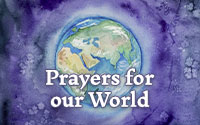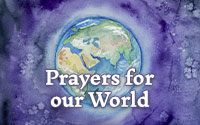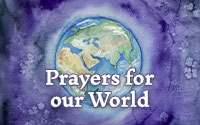July 16 is coming quickly, and it’s time to solidify your plan for joining us there!
Are you in?
Let us help you get to Together 2016!
Plan your schedule
You want to make the most of your trip to Together 2016, right? So do we! Head here to find sample schedules for a three, five, or seven day trip.
Book your hotel
Together 2016 has partnered with hotels in the the National Mall area so that you can book hotel rooms at a group rate. Be sure to check them out soon as room blocks are going fast.
Transportation
Together 2016 has partnered with GO GROUND to be our official transportation manager so you can charter a bus to D.C. They also have the option for you to sell extra seats if you are unable to fill an entire bus. Check out their website as well if you are interested in booking a seat on someone else’s bus that is coming from your area!
For those who are interested in flying to Washington, D.C., we suggest booking flights to:
7 Ronald Regan Washington National Airport (DCA) (closest)
8 Washington Dulles International Airport (IAD)
9 Baltimore-Washington International Airport (BWI)
Momentum is building and we can’t wait for you to join us and the one million others gathered on July 16, 2016. Keep telling others about Together 2016 through our Facebook, Twitter, and Instagram pages!
Standing with you,
The Together Team
Uniting as one, appealing to heaven to change the spiritual climate in our nation.
As One is a national call to prayer. The basic strategy revolves around two 40-day periods of prayer walking, fasting, and corporate prayer events. The first will start on Easter Sunday, March 27 and run through the National Day of Prayer on May 5. The second begins on September 30 and ends on Election Day. In addition, there will be much collaboration with major national prayer events that are happening throughout the year.
Here is how it works:
1) Join the 40-day Prayer Challenge and receive a daily prayer guide via email.
2) Adopt Your Street in Prayer.
3) Find or Host a Prayer Gathering on the National Day of Prayer, Thursday, May 5.
“So that with one mind and one voice, you may glorify the God and Father of our Lord Jesus Christ.” - Romans 15:6
Click here to learn more about this united effort to call America to prayer >>
Pray for Election Day
On November 8, 2016, millions will cast their vote, selecting from an array of candidates - potential leaders who will impact the direction of the United States of America. This is a freedom that has come at a high cost for many over the 240 years since declaring independence from England in 1776.
Calvin Coolidge, 30th President of the United States said, “If the people fail to vote, a government will be developed which is not their government… The whole system of American Government rests on the ballot box. Unless citizens perform their duties there, such a system of government is doomed to failure.”
Of the 52 million voter-eligible Christians in America, 10 million are not registered to vote for the elections, and over 20 million who were registered, did not vote in the previous election cycle. Quite simply, less than 40 percent of all eligible to vote Christians in America…voted.
Dwight D. Eisenhower, 34th President of the United States said, “The future of this republic is in the hands of the American voter.”
So here is what you can do:
1 Register to Vote and make it a priority to exercise this freedom - Click here to get started >>
2 Pray: “Look to Me and be saved, all the ends of the earth! For I am God, and there is no other.” -Isa. 45:22
Download your FREE 2016 ELECTION PRAYER GUIDE: 1) E-version 2) Print Ready PDF 3) Spanish
3 Find your local Family Policy Council and download your regional voter guide
4 Join the National Prayer Call, November 8, 11 a.m. - 12 noon ET: 712-432-0075, PIN: 4961322#
5 Commit to Pray for all people in authority (download your prayer points here)
6 Commit to pray for 40 days beginning September 30 through November 8 (download your 40-Day Prayer Guide)
National Prayer Summit
Make plans now to join with thousands of intercessors at the National Prayer Summit. This special gathering will take place July 14-17 in Washington D.C. and feature an incredible line-up of speakers including Francis Chan, Dr. Josh McDowell, Dr. Luis Palau, Dr. Ravi Zacharias, Kirk Franklin and music from Hillsong United. Registration is only $89 per person, so get registered today >>
Host a Prayer Gathering
Now as never before, Americans need to be in prayer for our country and its leaders in all spheres of influence. Your partnership is vital to the efforts our National Day of Prayer Task Force as we seek to fulfill our ongoing mission of bringing millions of people throughout this land before God’s throne in humble intercession.
To assist you in promoting the cause of prayer, we have included a variety of helpful resources in our online store. Whether you are seeking materials appropriate for a church setting or an event in a public venue, we have provided useful items that are both creative and practical.
Thank you for standing with us by lending your time and talents to this worthy endeavor. Your participation is key if we are to call every community in our nation to prayer!
Shirley Dobson, Chairman, NDP Task Force, http://www.nationaldayofprayer.org/
As Pakistan began burying its dead Monday, authorities counted 29 children among those killed by an Easter suicide bombing in an amusement park, victims of a terrorist attack that has reinforced growing feelings of dread here. Although 2015 was relatively quiet, horrified Pakistanis are again asking what their government can do to protect them from extremist violence. More than 70 people in all were killed in the devastating attack Sunday in Lahore. Officials vowed to hunt down the Islamist militant bombers who claimed they targeted Christians - yet killed many of their Muslim brethren in the bargain.
Even after a week of terrorist violence in Iraq, Turkey and Belgium, the attack here nonetheless became a focus of global dismay. It was the country’s worst terrorist attack this year and the deadliest attack in Pakistan since nearly 150 were killed at a school in Peshawar in late 2014 — a shock to the nation that led to an unexpectedly peaceful 2015. That calm period now seems to be over…
A splinter faction of the Pakistani Taliban, Jamaat ul-Ahrar, claimed responsibility for the attack, saying, “It was our people who attacked the Christians in Lahore, celebrating Easter.”
Pakistan, a country of 190 million, has suffered for years from sectarian violence and Islamist militancy, including a Taliban-led insurgency in the tribal areas on the border with Afghanistan. Recent terrorist attacks targeting minorities and schools have left many ordinary Pakistanis scared and on edge…
At Jinnah Hospital in Lahore, where about half of the more than 300 injured were taken Sunday night, 67 remained hospitalized with a variety of injuries, including burns and shrapnel wounds, doctors said. Politicians and TV anchors weaved among the beds, where occupants were labeled “blast victim.”
Among them were two small children, their beds marked with signs saying “unknown.” Their family died in the blast, and they had yet to be linked with other relatives…
In Islamabad on Monday, thousands of Muslim demonstrators protesting the execution of Islamist assassin Mumtaz Qadri staged a sit-in inside the capital city’s “Red Zone,” which is home to a number of vital government institutions, including Parliament and the prime minister’s house. Qadri assassinated Punjab’s governor, Salman Taseer, in 2011 over the latter’s opposition to Pakistan’s blasphemy laws.
Most blasphemy cases are lodged against non-Muslims for violations such as desecrating the Koran, Islam’s holy book, according to rights monitors. The army was deployed Sunday night to protect government buildings after the protesters rampaged across the city, damaging property and setting buildings on fire. (Contributors: By Annie Gowen and Shaiq Hussain for The Washington Post – Erin Cunningham in Kabul, Babar Dogar in Lahore, and Haq Nawaz Khan and Aamir Iqbal in Peshawar, Pakistan, contributed to this report.)
Pray for survivors and the victims’ families. There is worldwide confusion over international leadership’s failure to call these attacks “Islamist terrorism.” Pope Francis called the bombing “vile and abominable,” but last November he said Christians and Muslims are brothers and sisters. And Pres. Obama to call ISIS “Islamic terrorists.” Pray for clarity and global cooperation to stop these terrorist attacks.
Intercessors for America, On Watch in Washington, This email address is being protected from spambots. You need JavaScript enabled to view it.
Let’s also pray for the unity of the church leaders and prayer movement of Pakistan. Pray they will come together as one to pray for their nation and to withstand the powers of death and destruction that so often frequent their country through Islamic radical groups of various kinds.
As an often burnt-out mid-career missions leader in early 1990’s, I remember being deeply impacted by the writings of the Dutch theologian and contemplative, Henri Nouwen. His book The Way of the Heart describes the all important role of solitude and silence in our lives to purify us from being driven by the “false self”-- the constant need to conform ourselves to the expectations of those around us rather than living life from the inside out, from who we really are in the Lord.
Ruth Haley Barton is an author and spiritual director who leads the Transforming Center, a ministry to pastors and other ministry leaders. I was refreshed and encouraged by her book Strengthening the Soul of Your Leadership which is a take-off on Jesus’ warning, “And what do you benefit if you gain the whole world but lose your own soul? Is anything worth more than your own soul?” (Matthew 16:26). Her insightful work examines the experience of Moses and how his personal encounters with God in silence and solitude both prepared and undergirded him for 40 frustrating and challenging years of leading his people Israel to door of the Promised Land.
Here are some of the rich conclusions Barton comes to through her reflection on Moses’ long and quiet experience in the desert and how that experience made him fit to lead. She observes: “Moses’whole life can be viewed through the lens of his private encounters. He did not seem to have any great strategies for leadership except to seek God in solitude and then carry out what God revealed to him there. He routinely sought God (or God sought him), there was an encounter, and then Moses did what God told him to do. For Moses, leadership was that simple!”
In emulating Moses’ simple leadership style, she advocates our leaving the company of others for a time, letting go of our need to fix things outside ourselves and attend to what needs to be done “in the deep interior places of our life” as “the most important work to be done right now.” It is essential to have such times of aloneness with God, otherwise “our leadership cannot be a force for good if it is not being refined by the rigors of true solitude, that place where God is at work beyond what we are able to do for ourselves or would even know how to do for ourselves.”
It is in such times when we open ourselves fully to the searching presence of God that we begin to see things about ourselves that were lurking beneath the surface. For Moses, it was his tendency to erupt with uncontrolled anger. She writes: “Only those who have been brave enough to ride their own monsters of anger and greed, jealousy and narcissism, fear and violence all the way to the bottom will find a truer energy with which to lead. Only those who have faced their own dark side can be trusted to lead others towards the Light. This is where true spiritual leadership begins. Everything that comes before is something else.”
She talks of the bondage of “Christian busyness” which most of us understand quite well but often are not disciplined enough to escape. She also covers the often difficult task of leaders to guard the unity of the spiritual community as their most important occupation as reflected in Jesus’ last prayer for the disciples (John 17:11) since it is the way that the devil (diabolos or divider) is defeated and the world comes to believe in Him.
Though Moses was not allowed to go into the Promised Land, she thinks that he had come to the point in life where for him “the presence of God was the Promised Land” so it was not a punishment but actually a blessing that soon followed with his exiting earth into the pure presence of the Lord. Her summary sentence captures the essence of being leaders whose souls have not gotten lost along the way: “This is a leader with strength of soul—one who continually seeks God in the crucible of ministry and for that reason is able to stay faithful to the call of God upon their life—to do their small part—until God calls them home.” I heartily commend this valuable book for your own rumination and edification.
John Robb
Justin Bieber’s 'Bigger Than Satan' shirt
Pop idol Justin Bieber, who is a Christian, is currently travelling with his ‘Purpose’ tour and has incorporated a noteworthy shirt into the collection of clothes he wears onstage. Bieber can be seen wearing a shirt with the words ‘Bigger Than Satan’ on the back. The shirt comes from designer Jerry Lorenzo, whose brand ‘Fear of God’ aims to express a different side of Christianity. Bieber has recently become open about his Christian faith, after years of making headlines for breaking laws. The pop star said, ‘I just want to honestly live like Jesus. Not be Jesus - I could never - I don’t want that to come across weird. He created a pretty awesome template of how to love people and how to be gracious and kind. If you believe it, he died for our sins.’
Heightened security across nations
On 22 March the European Parliament raised its terror alert level in Brussels to orange and heightened security in close cooperation with the Belgian authorities, following the bombing attacks there. France has heightened its measures to monitor suspected personnel, and David Cameron has held meetings to discuss new measures of security in the British Isles. Across the nations a wave of apprehension, coupled with the determination to thwart terror attacks, appears to be taking hold. As well as praying for the victims, their families and friends, we can pray for the cities across Europe to stand strong against the hatred which is emerging at this time.
Kingdom values
In AD 849 King Alfred the Great wrote, ‘There is only one way to build my kingdom and that is on the sure and certain foundation of faith in Jesus Christ crucified.’ Although Alfred was never king of England as we now know it, his achievements made him the true founder of the Anglo-Saxon kingdom of the 10th and 11th centuries, before the Norman invasion. We can thank God for every aspect of Godly inheritance that He put within our land and for the kingdom foundations within our government, justice systems, and many aspects of our society. We can declare in prayer His purpose over this nation and for Him to display His kingdom and His kingship for our future.
Middle East special
Brian Mills was asked by Andy Page from Prayer Alert what was on his heart for the Middle East and what burning issues we could be praying about. He said that, thinking about Easter and beyond, people everywhere can pray for the Muslim nations at this crucial time. The Middle East is the place where the passion of the cross took place, and at the cross Christ Jesus said, ‘Father, forgive them, for they know not what they do’. Forgiveness is the primary element of the cross, and forgiveness needs to be in and with the people of this region. Wherever you look in the Middle East you see people in conflict. That needs to be recognised as we pray for the area, particularly Jerusalem. Forgiveness is very hard to find. Brian said that he was in Jerusalem recently and noticed that attitudes have hardened compared to when he was there a few years ago. He said that wherever you go in the Middle East you will see people at war with words and with weapons: we need to seek the Holy Spirit to touch and change lives.
Brian also mentioned that he had visited the United Arab Emirates recently, to attend a prayer gathering for the Middle East. Isaiah 19:23,24 was claimed for such a time as this, a time when God’s promise will be fulfilled and He will bring about a highway from Egypt to Assyria. The scripture says, ‘The Assyrians will come to Egypt, and the Egyptians to Assyria; and the Egyptians will worship with the Assyrians. On that day, Israel will be the third along with Egypt and Assyria, a blessing at the centre of the world.’ Brian commented, ‘Now is the time to pray for the areas of those nations to be together living in forgiveness: Syria, Lebanon, Iraq, Israel and beyond. Pray for Arab nations currently torn apart by strife to be united.’
Brian also pointed to the prayer needs of Turkey. Pray for the people fleeing to Europe, pray for the borders of Turkey that are fraught with conflict, pray for the people confined by closed borders. It’s another country in a region where people are looking for answers, living in places torn apart by conflict. We have to pray that people will find physical and spiritual refuge in the safety of belonging to Jesus. We can also thank God for the way that Lebanon and Iraq are planting churches and seeing people born again of God’s Spirit. We can praise Him for the response to the gospel that mission and aid agencies are seeing in the Middle East.
To view the full Brian Mills interview, click the ‘more’ button.
USA: 2016 election special
The stakes are high for Donald Trump, who is attempting to present himself as a pro-Israel candidate for presidency. The real estate mogul has repeatedly said he would be ‘the best thing that could ever happen to Israel,’ but some of his other statements have sown considerable doubt. The Anti-Defamation League, a Jewish civil rights-human relations organisation, announced that it was redirecting all of Trump’s donations ($56,000), citing the ‘stereotyping and scapegoating that have been injected into this political season.’ This week Hilary Clinton promised she would stand unwaveringly with Israel while accusing her potential rival, Mr Trump, of being an unreliable partner for one of America’s closest allies. ‘We need steady hands,’ she said, ‘not a president who says he’s neutral on Monday, pro-Israel on Tuesday, and who-knows-what on Wednesday.’
Recently Prayer Alert asked John Robb, the chairman of the International Prayer Council, how we could pray for the United States of America. John said that over the past 25 years he has facilitated 61 prayer initiatives across the nations; God has broken through over and over again in response to the prayers of the people who humbled themselves and sought his face in prayer. 2016 is a pivotal year for them, as the result of the USA’s national election in November will affect the world. We are invited to join Americans in the coming months as they embark on two forty-day prayer and fasting initiatives for their nation. Christians will be prayer-walking everywhere across the USA, humbling themselves and ‘getting right with God.’ There will also be a Prayer Assembly at the end of October just before elections. Christian prayer networks, churches and organisations will unite to pray for the new leadership of the USA. John also mentioned a wonderful international youth prayer assembly in South Korea in July. For prayer assembly information read the article below. To watch a video of John Rob’s comments go to
World youth prayer assembly
The International Prayer Council are calling for a global Prayer UPRISING from 26 to 30 July 2016 - a united prayer rising in Seoul, South Korea. They say, ‘With the global crisis this generation is facing and the attacks on them, we believe that it's time to gather the youth from across the nations for a prayer assembly to stand against attacks on this generation. The youth are this generation’s Davids, and they will fast and pray and face the Goliaths of this world. They will stand for South and North Korean unity as they intercede at the border of these two nations, believing now is the time to pray for their unification. They will fast and pray as they intercede for change in the regions and the nations.’
UPRISING will call forth and engage an emerging generation, tens of thousands from every nation, to challenge and empower them to fulfil their destiny as catalysts for Christ's Kingdom. It will be a springboard for new youth movements, new youth ministries and new prayer and missions movements. It could also possibly give birth to a new, global Jesus Movement, finding its beginnings at the UPRISING. Pray that God will mobilise the youth of today, in united prayer for the healing of the nations. To watch a short video of Bishop Peter’s invitation to this event go to:










